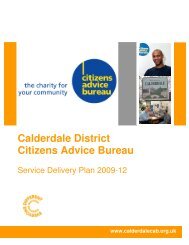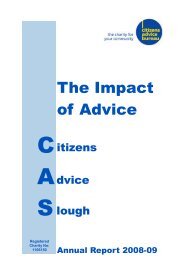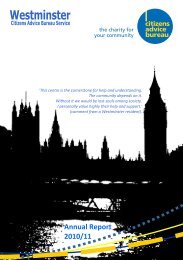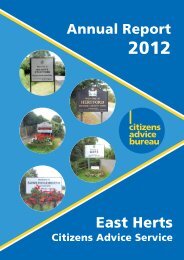Interview questions for Prudential-funded projects - Citizens Advice
Interview questions for Prudential-funded projects - Citizens Advice
Interview questions for Prudential-funded projects - Citizens Advice
You also want an ePaper? Increase the reach of your titles
YUMPU automatically turns print PDFs into web optimized ePapers that Google loves.
North Liverpool <strong>Citizens</strong> <strong>Advice</strong> BureauFinancial Skills <strong>for</strong> Life (FSfL) projectProject backgroundThe FSfL project started in January 2003. Peter Tyson, a CAB community moneyadvisor, was appointed as the financial literacy tutor. Peter already had someexperience in this area of work as his previous role had included an element ofmoney awareness but this had mainly been with schools.StaffSiw Jones manages the project. Peter Tyson is <strong>funded</strong> as the trainer <strong>for</strong> 25 hours aweek.Original aspirations and hopesThe bureau had realised the extent of financial illiteracy as they were seeing moreand more younger people coming into the bureau with debt problems. Some ofthese young people had lost their homes due to their lack of ability to handle theirfinances and the bureau was keen to take on more preventative work.ScopeThe project began by working with young people moving into work from benefits buthas now broadened out to include young pregnant women and ‘buddy’ communityparents who work with young families.The project serves the north side of Liverpool, which is covered by four bureaux,making up a mini-district. The south side of the city is covered by Speke CAB whoare also involved in financial skills work, <strong>funded</strong> by CLS. Speke CAB and NorthLiverpool work closely together on their financial skills work.Materials and delivery of trainingThe project has found that delivering to small groups is the most effective method oftraining. There have been a few bureau referrals <strong>for</strong> one-to-one sessions butadvisers find it difficult to suggest to clients that they are in need of money skillstraining, especially as advice clients are often in need of emergency help and are notin the frame of mind to take on education.
The project uses a wide variety of training techniques. ‘Chalk and talk’ is definitelynot the way to engage with young people so workshops need to be very interactive.For example, in the credit workshop, each group is given a flipchart and marker penand asked to list all the places you can get credit or take out HP. The group will thenlook at, <strong>for</strong> example, the cost of a TV in the Brighthouse catalogue; how much itcosts <strong>for</strong> cash (£562) and compare that to how much you will pay if you take out HP(£7.99 x 156 instalments = £1,246.44). This is compared with the cost of taking outa cash loan <strong>for</strong> the same amount from a bank or a credit union.Other activities include a version of Play Your Cards Right (which APR is higher orlower) and True or False. Peter finds that mixing and matching activities works well;a few case studies followed by an activity, <strong>for</strong> example. Prizes are collected fromvarious partners, bookmarks, yoyos and stress toys, and ‘awarded’ to learners.Courses cover a range of topics, including credit, budgeting and general moneymanagement, and are tailored to clients’ needs. For example, MerseysideAccommodation Project works with homeless young people moving into hostels andother accommodation. They ask <strong>for</strong> courses to include what happens when youmove in to a new home – council tax, setting up utility accounts etc.Setting up the projectThe project began in January 2003. Work with learners was able to start almostimmediately because the work was already part of Peter’s job and sessions could bearranged with his established groups.Barriers and challenges, successes and disappointmentsBuilding relationships with groups where there was no prior connection was achallenge at the beginning. Tapping into existing groups with agencies with whomthey already had an established relationship was a more effective way to reachlearners.Advertising sessions and waiting to see who turns up was also less than successful,as were individual referrals. The project gave New Deal and Connexions workers‘individual referral’ <strong>for</strong>ms to pass onto their clients but none have been returned.To promote new partnerships, Peter produced a leaflet that was sent to potentialagencies and then followed up with a call. Agencies such as New Deal, who haveGovernment contracts to deliver these types of services to young people, were gladthat CAB were there to do support that work.It was a challenge to reach young people from new communities, like asylumseekerswho now have resident status. Language barriers make it difficult to deliversessions directly. The project has overcome this by delivering second-tier training tohousing support workers who are working with those groups and who useinterpreters. They have also produced basic fact sheets that have been translatedinto other languages.
The number of sessions and learners reached has exceeded expectations andtargets.Wider benefitsThe project provides an added resource <strong>for</strong> other CAB advisers involved in aspectsof money advice. If a CAB adviser, <strong>for</strong> example from the asylum service, has a clientwith a particular money issue, like not having a bank account, that adviser may wellconsult Peter to help support a client.The project tries to integrate with other <strong>projects</strong> in the bureau, like the mental healthservice users and prison <strong>projects</strong>. For example, the pre-release prisoners usePeter’s training pack and materials.Partner agenciesThe project drew up a list of possible partners that they wanted to work with. It hasnow worked with about 27 different organisations, including:• Oakmere Training: provides a wide range of training in the Merseyside area<strong>for</strong> young people. The bureau provides money management courses as partof their social development curriculum• North West Community Training and JHP Training• Furniture Resource Centre: af<strong>for</strong>dable furniture <strong>for</strong> long-term unemployed• Merseyside Accommodation Project: single, young people• Cavendish Drive: parents and under-ones• Walton Young Mums; recommended to them by Sure Start• Sure Start: Peter has trained community parents (buddies) who are the linksbetween Sure Start and clients• Home Ground: young people’s hostel• Women’s Aid: sessions with both volunteers and the women themselves atthe hostel• East Liverpool Probation Service• Prince’s Trust: worked with Fire Brigade staff seconded to deliver 12-weekcourses <strong>for</strong> socially-excluded youngsters, including community and socialdevelopment (sexual health and drug awareness), as well as abseiling andoutdoor activities• Outreach courses at Skelmersdale and Ormskirk College. Three 12-weekcourses including social developmentRelationships have worked very well with all partners and feedback has been verypositive. Peter has endorsement letters from Oakmere Training, ConnexionsSupported Living Project and Walton Young Mothers. Oakmere Training’sassessors (Learning and Skills Council) have also observed the training.
FundingFunding from <strong>Citizens</strong> <strong>Advice</strong> in partnership with <strong>Prudential</strong> plc covers Peter’s 25hours a week post.Headline figuresTraining has been delivered to 931 people since April 2003. There have been 154workshops in partnership with 27 organisations.Case studiesThe following people can be contacted <strong>for</strong> more in<strong>for</strong>mation about their experience ofworking with the project:Cath Neil at Oakmere Training, telephone 0151 521 3563.Adele Scotton at West Everton and Breckfield Sure Start, telephone 0151 233 1969.The futureIn terms of content the bureau are looking at ways of training on other topics that willaffect the audiences they work with, eg the Child Trust Fund.The bureau is very keen <strong>for</strong> the work to continue and would like to expand to allgroups (currently working with people aged 16-24), eg to people at pre-retirement.They are also conscious of the value of training the support workers, to help themsupport their clients, and would like to expand that area.For further in<strong>for</strong>mation about the project please contact:Siw JonesManagerNorth Liverpool CAB36-38 Breckfield RoadNorth LiverpoolL5 4NHTel: 0151 285 1082E-mail: siw@northliverpoolcab.co.ukOr:Peter TysonFinancial Literacy TutorTel: 0151 287 1300E-mail: norrisgreen, fswCompiled June 2005


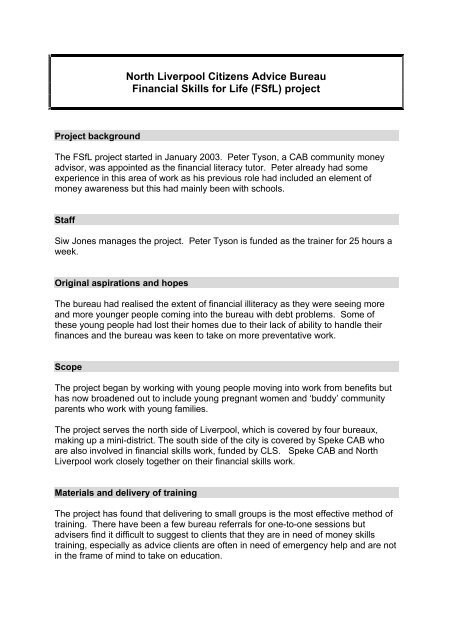
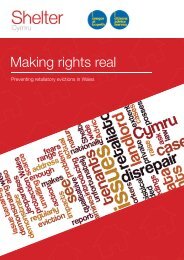

![Annual review [ 1.4 MB] - Citizens Advice](https://img.yumpu.com/50679529/1/190x135/annual-review-14-mb-citizens-advice.jpg?quality=85)

![Help for helping your residents [ 2.4 MB] - Citizens Advice](https://img.yumpu.com/48848542/1/185x260/help-for-helping-your-residents-24-mb-citizens-advice.jpg?quality=85)


